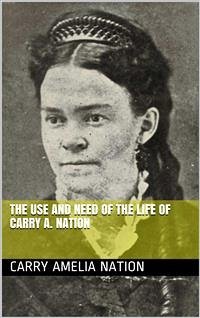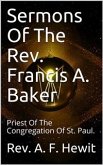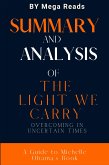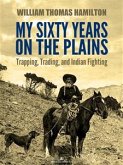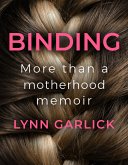Carrie Amelia Nation (forename sometimes spelled Carry; November 25, 1846 – June 9, 1911) was an American woman who was a radical member of the temperance movement, which opposed alcohol before the advent of Prohibition. She is remembered for attacking alcohol-serving establishments (most often taverns) with a hatchet.
Nation was also concerned about tight clothing for women. In fact, she refused to wear a corset and urged women not to wear them because of their harmful effects on vital organs.
She described herself as "a bulldog running along at the feet of Jesus, barking at what He doesn't like", and claimed a divine ordination to promote temperance by destroying bars.
As a primary source Nation's autobiography does a great job of illuminating:
1. Nation's belief that she was called by God to smash saloons.
2. The personal details of Nation's life, including especially her childhood and marriages.
3. Nation's experiences during her smashing campaign, including time spent in jail and confrontations with certain officials.
4. The on-going conflict between Nation and "main-stream" Christians who were critical of her work, including her second husband.
5. Nation's use of scripture to justify her actions.
6. The relationship between Nation and other temperance organizations, such as the WCTU.
It really gave a good understanding of Carrie Nation and the other women of this time who suffered greatly due to alcohol and the affects that alcohol had on American families at this time.
Hinweis: Dieser Artikel kann nur an eine deutsche Lieferadresse ausgeliefert werden.
Nation was also concerned about tight clothing for women. In fact, she refused to wear a corset and urged women not to wear them because of their harmful effects on vital organs.
She described herself as "a bulldog running along at the feet of Jesus, barking at what He doesn't like", and claimed a divine ordination to promote temperance by destroying bars.
As a primary source Nation's autobiography does a great job of illuminating:
1. Nation's belief that she was called by God to smash saloons.
2. The personal details of Nation's life, including especially her childhood and marriages.
3. Nation's experiences during her smashing campaign, including time spent in jail and confrontations with certain officials.
4. The on-going conflict between Nation and "main-stream" Christians who were critical of her work, including her second husband.
5. Nation's use of scripture to justify her actions.
6. The relationship between Nation and other temperance organizations, such as the WCTU.
It really gave a good understanding of Carrie Nation and the other women of this time who suffered greatly due to alcohol and the affects that alcohol had on American families at this time.
Hinweis: Dieser Artikel kann nur an eine deutsche Lieferadresse ausgeliefert werden.

